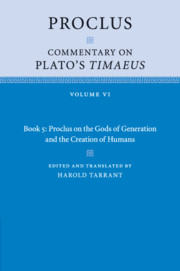Book contents
- Frontmatter
- Dedication
- Contents
- Acknowledgements
- Note on the Translation
- Introduction to Book 5
- On the Timaeus of Plato: Book 5: Proclus on the Gods of Generation and the Creation of Humans
- On the Timaeus of Plato: Book 5, Proclus on the Gods of Generation and the Creation of Humans
- References
- English-Greek Glossary
- Greek Word Index
- General Index
On the Timaeus of Plato: Book 5, Proclus on the Gods of Generation and the Creation of Humans
from On the Timaeus of Plato: Book 5: Proclus on the Gods of Generation and the Creation of Humans
Published online by Cambridge University Press: 01 July 2017
- Frontmatter
- Dedication
- Contents
- Acknowledgements
- Note on the Translation
- Introduction to Book 5
- On the Timaeus of Plato: Book 5: Proclus on the Gods of Generation and the Creation of Humans
- On the Timaeus of Plato: Book 5, Proclus on the Gods of Generation and the Creation of Humans
- References
- English-Greek Glossary
- Greek Word Index
- General Index
Summary
THE SUBLUNARY GODS (40E5–41A6)
Introduction to the Sublunary Gods
General Theory
The account of the sublunary gods (hoi hypo selênên theoi) is a continuation of the study of the heavenly gods and it derives its perfection and scientific nature from its being dependent upon it. This is because the actual generation-producing (genesiourgos) chorus of gods takes after those in the heaven, and, in imitation of the rotation of the heaven, it turns things in generation too in a matching rotation. For in accordance with the undivided and unified procession secondary things follow what precedes them. Accordingly, because those who govern generation are positioned immediately below heavenly [gods], it is because of this that they also revert upon them in a single, partition-free unification, just as they too [revert] to the hyper-heavenly [gods], from whom they have been born next in line; whereas these latter [revert] to the intellective [gods] by whom they were arranged, and the intellective again [revert] to the intelligible [gods], from whom they have been brought to light, since they embrace all things in some concealed fashion that can neither be stated nor otherwise expressed. Assuredly the race of intelligible gods is the summit of all that truly golden series itself, whereas its limit is [the race] of the sublunary gods, which take charge of (epitropeuein) generation and nature in a non-generated and supernatural manner. This [limit] is also something that the Demiurge's plan (nous) is now establishing, when the leadership of the gods stretches down from the heavens above reaching to the furthermost things.
Let it now be our purpose to speak about this [race of gods], and [to state] firstly that all gods now being established preserve the [power of] engendering (gennêtikon) and perfecting that belongs to the one who engendered them and the craftsmanship (dêmiourgikon) and stability (statheron) of creation, and they received from the Father measures and limits and order. All things that he oversees in a transcendent and universal manner, they divide according to lots, and then craft, engender, or perfect them. Some of them are close to the heavenly gods, while others have proceeded further, so that some are able to preserve their character (idea) as far as possible in this order while others abide by it to the extent that they are able.
- Type
- Chapter
- Information
- Proclus: Commentary on Plato's Timaeus , pp. 37 - 250Publisher: Cambridge University PressPrint publication year: 2017



